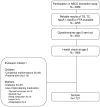Maternal prepregancy BMI and lipid profile during early pregnancy are independently associated with offspring's body composition at age 5-6 years: the ABCD study
- PMID: 24740157
- PMCID: PMC3989215
- DOI: 10.1371/journal.pone.0094594
Maternal prepregancy BMI and lipid profile during early pregnancy are independently associated with offspring's body composition at age 5-6 years: the ABCD study
Abstract
Background: There is growing evidence that disturbances in maternal metabolism and, subsequently, intrauterine conditions affect foetal metabolism. Whether this has metabolic consequences in offspring later in life is not fully elucidated. We investigated whether maternal pre-pregnancy body mass index (pBMI) is associated with offspring's adiposity at age 5-6 years and whether this association is mediated by the mother's lipid profile during early pregnancy.
Methods: Data were derived from a multi-ethnic birth cohort, the Amsterdam Born Children and their Development (ABCD) study (inclusion 2003-2004). During early gestation mothers completed a questionnaire during pregnancy (pBMI) and random non-fasting blood samples were analysed for total cholesterol (TC), triglycerides (TG), apolipoprotein A1 (ApoA1), apolipoprotein B (ApoB) and total free fatty acids (FFA) in early gestation. At age 5-6 years, child's BMI, waist-to-height-ratio (WHtR) and fat% were assessed.
Results: Only non-diabetic mothers with at term-born children were included (n = 1727). Of all women, 15.1% were overweight(BMI: 25-29.9 kg/m2) and 4.3% were obese (BMI≥30 kg/m2). After adjustments for confounders, every unit increase in pBMI was linearly associated with various offspring variables: BMI (β 0.10; 95% CI 0.08-0.12), WHtR*100 (β 0.13; 95% CI 0.09-0.17), fat% (β 0.21; 95% CI 0.13-0.29) and increased risk for overweight (OR:1.15; 95% CI 1.10-1.20). No convincing proof for mediation by maternal lipid profile during early gestation was found. Moreover, maternal FFA was associated with the child's fat percentage, BMI and risk for overweight. Maternal ApoB and TC were positively associated with the offspring's fat percentage and maternal TG was positively associated with their children's WHtR.
Conclusions: Both pBMI and maternal lipids during early pregnancy are independently related to offspring adiposity.
Conflict of interest statement
Figures
References
Publication types
MeSH terms
Substances
LinkOut - more resources
Full Text Sources
Other Literature Sources
Medical
Miscellaneous



